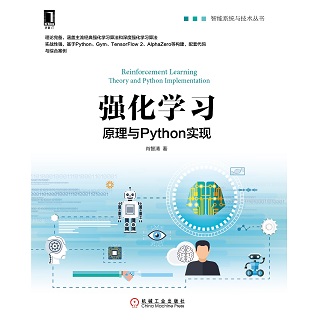世界上第一本配套 TensorFlow 2 代码的强化学习教程书
**第一本配套 TensorFlow 2 代码的纸质算法书
本书介绍强化学习理论及其 Python 实现。
- 理论完备:全书用一套完整的数学体系,严谨地讲授强化学习的理论基础,主要定理均给出证明过程。各章内容循序渐进,覆盖了所有主流强化学习算法,包括资格迹等非深度强化学习算法和柔性执行者/评论者等深度强化学习算法。
- 案例丰富:在您最爱的操作系统(包括 Windows、macOS、Linux)上,基于最新的 Python 3.8、Gym 0.17 和 TensorFlow 2.2(兼容 TensorFlow 1.15),实现强化学习算法。全书实现统一规范,体积小、重量轻。第 1~9 章给出了算法的配套实现,环境部分只依赖于 Gym 的最小安装,在没有 GPU 的计算机上也可运行;第 10~12 章介绍了多个热门综合案例,涵盖 Gym 的完整安装和自定义扩展,在有普通 GPU 的计算机上即可运行。
- 初识强化学习 查看代码:useGym
- Markov决策过程 查看代码:useBellman CliffWalking
- 有模型数值迭代 查看代码:FrozenLake
- 回合更新价值迭代 查看代码:Blackjack
- 时序差分价值迭代 查看代码:Taxi
- 函数近似方法 查看代码:MountainCar
- 回合更新策略梯度方法 查看代码:CartPole
- 执行者/评论者方法 查看代码:Acrobot
- 连续动作空间的确定性策略 查看代码:Pendulum
- 综合案例:电动游戏 查看代码:Breakout Pong Seaquest
- 综合案例:棋盘游戏 查看代码:TicTacToe Reversi boardgame2
- 综合案例:自动驾驶 查看代码:AirSimNH
QQ群
- 群号:935702193 (免费入群)
- 关于入群验证问题:由于QQ的bug,即使正确输入答案,也可能会验证失败。这时更换设备重试、更换输入法重试、改日重试均可能解决问题。如果答案中有英文字母,清注意大小写。人名的首字母应大写。
书籍勘误与更新
判断纸质版书籍版次的方法 / 确定纸质书印刷时间的方法
- “前言”之前有1页是“图书在版编目(CIP)数据”。这页下部的表格中有一项是“版次”,该项标明当前书是什么时候第几次印刷的。
本书数学符号表
本书电子版
本书不仅有纸质版销售,也有电子版销售。不过,电子版没有提供配套的勘误与更新资源,所以推荐购买纸质版。电子版销售平台包括但不限于:
- 华章鲜读:微信订阅公众号“华章电子书”,“在线书城”,搜索“强化学习”,在“鲜读”栏目下找到本书
- Kindle电子书:https://www.amazon.cn/dp/B07X936G34/
- 京东读书:https://e.jd.com/30513215.html
- 知乎书店:https://www.zhihu.com/pub/reader/119634282
The First Reinforcement Learning Tutorial Book with TensorFlow 2 Implementation
This is a tutorial book on reinforcement learning, with explanation of theory and Python implementation.
- Theory: Starting from a uniform mathematical framework, this book derives the theory and algorithms of reinforcement learning, including all major algorithms such as eligibility traces and soft actor-critic algorithms.
- Practice: Every chapter is accompanied by high quality implementation based on Python 3.7, Gym 0.17, and TensorFlow 2.1.
- Introduction of Reinforcement Learning
- Markov Decision Process
- Model-based Numeric Iteration
- Monte-Carlo Learning
- Temporal Difference Learning
- Function Approximation
- Policy Gradient
- Actor-Critic
- Deterministic Policy Gradient
- Case Study: Video Game
- Case Study: Board Game
- Case Study: Self-Driving Car
BibTeX
@book{xiao2019,
title = {Reinforcement Learning: Theory and {Python} Implementation},
author = {Zhiqing Xiao}
year = 2019,
month = 8,
publisher = {China Machine Press},
}
